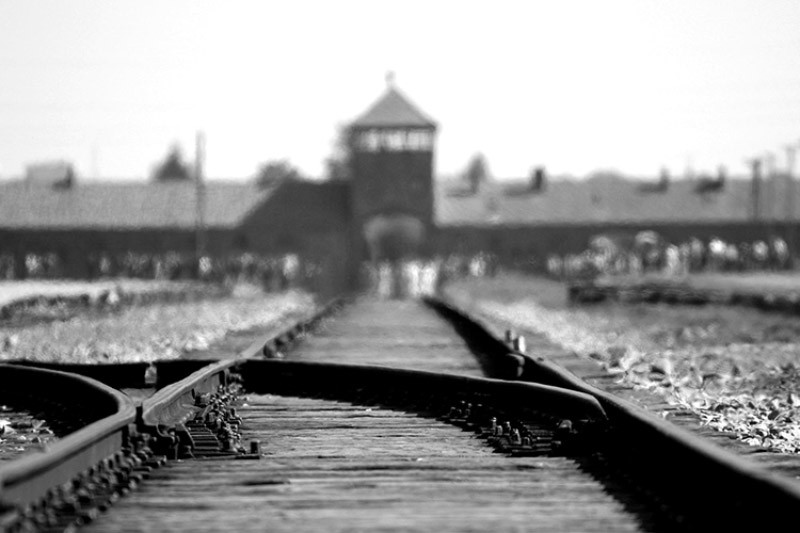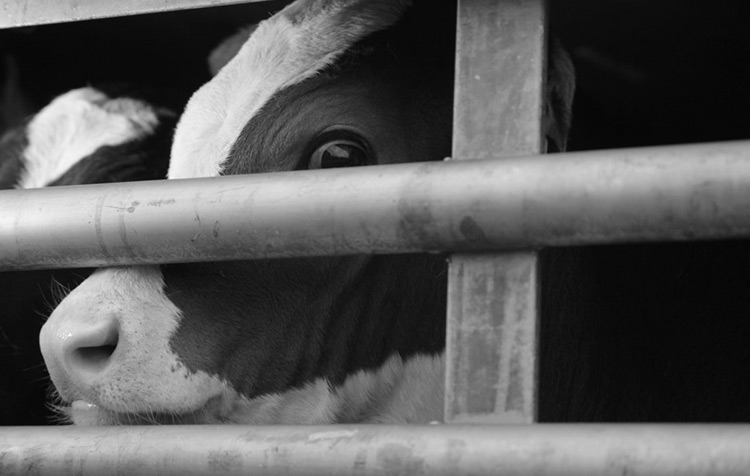More and more often you hear that animal rights activists or vegans have the Holocaust with factory farming compare. The reactions to this range from shocked to understanding. Is it allowed to make this comparison? My opinion: of course it is allowed to compare, because it is allowed to compare everything with each other, if the comparison serves the purpose to question oneself and to check if one's own behavior is in accordance with one's own values.
One may compare factory farming with the Holocaust - but one cannot and must not claim that it is exactly the same. A logical comparison cannot even culminate in the opinion that factory farms and concentration camps are "exactly the same". Because this much should be said in advance: besides some similarities, there are of course also thousands of differences. However, in order to derive the greatest possible benefit from this comparison, to be able to empathize better with farm animals and to check the harmony between our moral values and our actions, I would like to focus here primarily on the existing similarities.
We all want something so cruel to never happen to anyone again. Never again. Not to any human being, not to any animal. In the following, I would therefore like to venture a comparison between factory farming and the Holocaust. With maximum respect for the victims of the Nazi genocide - and for all sentient beings on this planet.
Here is another short Table of contents about the article:
Background of the comparison of factory farming and the Holocaust
This text is especially close to my heart because I want to fight all injustices in our global society. The aim of this comparison is to make all readers aware of how we treat animals to satisfy our habits and taste buds, to clothe ourselves, to perform experiments on them and to be entertained.
The question I would have to deal with here is not "may" but "can" one compare factory farming and the Holocaust? I am not comparing the victims, but the deeds. We are all probably more sensitive to the oppression of people. But we still share this planet with others, sentient beings - whose suppression we should also be critical of. I can understand the immediate reaction of being incensed that someone dares to compare the two. But also what we did to the animals will definitely go down in history as something that future generations will look upon with disgust.
Definitions
A comparison involving such a sensitive subject as the mass extermination of the Jews requires a extremely cautious approach. The basis for this is laid by the following definitions of the terms "comparison", "factory farming" and "holocaust".
Comparison: A comparison is a comparative observation. In literature one speaks also the comparison is a word figure, which is produced by the approximation or contrastive juxtaposition of two objects or pictures, in order to increase vividness and effectiveness of an idea.
Factory farming: Systematic, technical animal husbandry on large farms, to obtain as many animal products as possible. More under Factory farming.
Holocaust: The systematic extermination of entire populations (during National Socialism).
Similarities between the Holocaust and factory farming
Please be sure to first check out the linked Interview of the Holocaust survivor Alex Hershaft an. It clarifies my reasons for writing this post. I would like to briefly present some of the similarities between the Holocaust and factory farming that he recognizes.
Numbering
Each prisoner received a brand upon admission to a concentration camp. From that time on, he no longer had a name in the concentration camp. He was called by this tattooed number and had to report to each superior with this number.₁ The numbering and other signs were used to group a prisoner by country, race, previous convictions and other characteristics.
Even in factory farming, cattle, pigs or sheep receive Earmarks and no name. This can be used in a farm's system to identify, for example, how old an animal is or what date of death is planned.
Gasification
Gas chambers existed in six killing centers, several concentration camps and all extermination camps during the Nazi era. In Gas chambers are mainly used for pigs at "slaughter age" (see embedded video) and small, male chicks directly after birth (see also Chick Shredding) gassed. The industry refers to the so-called CO2 killing than the Most humane way of killing. Can you remember another time in our history when we pushed innocent beings into gas chambers? In answering this question, the word "Holocaust" would probably come up for each of us.
Tip: I was made aware of the brutality by the Dominion film clear. You can watch it for free at the link. It shows the exploitation of animals for our food, entertainment, experiments and clothing and definitely leaves a lasting impression.
Mass destruction
More than six million Jews were murdered by Germans during the time of the National Socialist regime.₂
According to the Federal Statistical Office, around 2 million animals are currently killed by humans every day in Germany alone.₃ About 200 million "farm animals" are killed every day worldwide. That's 74 billion animals a year.₄ So both the Holocaust and factory farming are systematic mass extermination of living things.
Living conditions
Imprisoned Jews had to in narrow, dark rooms sleep and live on wooden racks as long as they had a use for the National Socialists.
Cows, pigs or chickens also live in cramped, dark contraptions designed only to keep them for a specific, economic purpose.
Abuses
During the Holocaust, both men and women were subjected to persecution and violence. Although some Jewish men experienced various forms of sexual violence, the majority of the Rape Victim women.₅ Also the Spanking punishments were sadistic and in many cases led to an agonizing death.₆
Even in factory farming, mistreatment is part of the animals' lives. Cows, for example, are forced into a tight contraption so they can't move. Then, they are held by a grip in the exit opening of the intestine artificially impregnated with bull semen. An act that probably everyone would call rape if done to a human being. In addition, cows have their horns removed and pigs have their teeth ground off and their curly tails cut off to prevent them from hurting each other. Chickens have their extremely sensitive beaks shortened for the same reasons.
Tip: At Reasons for veganism learn even more about my motivation to renounce the exploitation of animals for my personal lifestyle.
Systematics
A massive bureaucratic apparatus helped the perpetrators to systematic extermination of the Jews. However, they did not always come face to face with their victims.
Factory farming is also thoroughly organized and based on economic efficiency trimmed. In the middle of the 20th century, for example, a dairy cow still pressed an average of 2,349 liters out of its udders - today, at 8,059 liters, it is well over three times that amount.₇ As soon as it does not produce milk, it is killed and processed into meat. (more at Why Do Vegans Not Drink Dairy Milk? The Best Reasons to Stop Drinking Cow's Milk)
Consumers should not see what happens behind the closed doors of slaughterhouses. Because then they would lose their appetite.
Exploitation
With the need for manpower in the armaments industry during the Second World War, the importance of the "economic benefit" of Jewish workers. Therefore, the National Socialists were no longer concerned exclusively with the extermination of Jews, but also with exploiting their labor performance until their predetermined death.₈
Also Animals are exploited for their body parts. This is also about economic benefit. Be it meat, milk, eggs or fur. The animals are caught (or bred) to steadily meet the demand for their body parts. A commonality that links factory farming and the Holocaust. Or what would you call it if we replaced all the animals in a factory farm with humans? Probably words like "elimination" or "exploitation" would cross your lips as well.
Racism/Speciesism (Injustice)
The Holocaust and factory farming also share the commonality of injustice. Jews were killed because of the ReligionThey were persecuted and killed by the people to whom they belonged and into whom they were born. That is Anti-Semitism.
Animals in factory farming are captured, bred and killed because they are Springs, Wool, Wing or Fur and we humans feel superior to them. Since we were little, however, we have made a distinction. We are taught to love animals like dogs, cats and dolphins, but to eat cows, pigs and chickens. That is Speciesism.
Transports
As so-called "Cattle cars" is the term used primarily by Holocaust survivors to describe special freight wagons with devices for transporting horses in which Jews were deported to extermination camps.
Cows, pigs and all the other animals that will one day end up on our plates are also made into a Slaughterhouse transported. Since presumably everyone has seen a cattle truck, this similarity between factory farming and the Holocaust requires no special imagination.
Acceptance
Regarding the Holocaust, one question is heard particularly often: How could it actually come to this? Today, it is assumed that there were 200,000 to 250,000 German, Austrian and "ethnic German" perpetrators of the Holocaust. It is assumed that the camaraderie completely eliminates the sense of personal responsibility Moreover, the cruel deeds were kept secret behind the closed doors of the concentration camps as much as possible.
It is a mixture of Ignorance and Conditioningwhich has led us to accept the brutality of factory farming, even though the majority of us would probably claim to love animals. And so it happens that we use excuses like "We have always eaten meat" instead of making us aware of the benefits of a vegan lifestyle for the environment, animals and our own health. We know the problems - but many people believe they can solve them by ignoring them. (Ostrich tactic)
"From the point of view of animals, all people are Nazis - and life is an eternal extermination camp [Treblinka]." says Holocaust survivor Alex Hershaft.₁₀
Holocaust and factory farming - a comparison against oppression

In addition to the commonalities mentioned above, there are of course thousands of differences between factory farming and the Holocaust. But it is the similarities that should make us think. Just because we find one worse than the other, we should not be completely indifferent to the "less bad". In the end, both the Holocaust and factory farming are about injustice. The oppression of a certain group of sentient beings.
We agree that we never want to see such injustices again. As far as we humans ourselves are concerned, we have learned from this. Nevertheless, factory farming, which has many similarities to the Holocaust, is still socially accepted. Acts against innocent living beings for superfluous reasons. Animals enter the slaughterhouse alive and come out in small pieces - and we humans like to believe that something "humane" happened in it. Animals have done nothing to us and we can also eat a plant-based diet and do without animal consumer goods.
The oppression of animals is the gateway drug to the oppression of human beings. If we end one, we will help ensure that the other will never happen again. I am sure of that.
Stay empathetic,

PS: Under vegan life you'll get a good start on an ethical and plant-based lifestyle.
References:
₁ A. Jordan: The Marking of Concentration Camp Prisoners (as of October 2008), available at https://t1p.de/ewok. [22.09.2020].
₂ Norddeutscher Rundfunk: Holocaust - The Unprecedented Crime, https://t1p.de/rd48. [22.09.2020].
₃ M. Brandt; Federal Statistical Office: Over 2 million animals slaughtered daily, available at https://t1p.de/z5no. [22.09.2020].
₄ Things Explained - In Brief: Meat - The World's Tastiest Evil, YouTube, Jan. 24, 2019, web, May 07, 2020 at 10:50 a.m., in: http://y2u.be/y6f3dwxexZM.
₅ M. Havryshko: Sexualized Violence in the Holocaust: Perspectives from Ghettos and Concentration Camps in Ukraine (accessed May 18, 2020), available at https://t1p.de/3mex. [22.09.2020].
₆ A. Reisin: Concentration Camps: "Everyday Life" in Hell (as of Jan. 23, 2020), available at https://t1p.de/cea1. [22.09.2020].
₇ A. Deter: How much milk does a cow give (as of 07/29/2019), available at https://t1p.de/2vhz. [07.05.2020].
₈ Bundesarchiv: Forced Labor Camps for Jews (ZAL for Jews), available at https://t1p.de/5zma. [07.05.2020].
₉ S.-F. Kellerhoff: What Turned a Quarter of a Million Germans into Murderers?, accessed https://t1p.de/wx31 [07.05.2020].
₁₀ Joey Carbstrong; Dr. Alex Hershaft: People React To THE ANIMAL HOLOCAUST, YouTube, Apr. 18, 2016, web, Sept. 23, 2020 at 10:50 a.m., in: http://y2u.be/8u7Utoq_Jzk.






